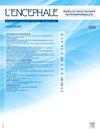Prevalence of hepatitis C, hepatitis B and HIV and their therapeutic management in a French public psychiatric hospital
IF 1.2
4区 医学
Q4 NEUROSCIENCES
Encephale-Revue De Psychiatrie Clinique Biologique et Therapeutique
Pub Date : 2025-02-01
DOI:10.1016/j.encep.2023.11.023
引用次数: 0
Abstract
Introduction
Several studies suggest that the prevalence of hepatitis C, hepatitis B and HIV are higher in psychiatric patients than in the general population; however, few French studies have been published. The aims of this study were to determine the seroprevalence of the three viruses, describe the profile of infected patients and evaluate the initiation of antiviral treatment in a population of patients hospitalized in a psychiatric hospital.
Method
Between January and October 2020, screening for hepatitis C virus, hepatitis B virus and HIV was systematically offered to all patients admitted to the intersectoral reception and orientation unit of a psychiatric hospital. If serology was positive, viral load was automatically determined from the same blood sample. As direct-acting antivirals (DAAs) are not financed “in addition” to hospital charges, it was decided a priori to start treatment for HCV immediately before discharge.
Results
Between January 7 and October 1, 2020, 407 patients accepted screening. Of these patients, 17 (4.2%; 95% CI: 2.2–6.1%) were anti-HCV positive and two were anti-HIV+/anti-HCV− (0.49%). HCV RNA was detectable in 9/17 anti-HCV+ patients, with a prevalence of infection of 2.2% (CI: 0.8–3.6%). Drug use was identified in 16 anti-HCV+ patients (94%), ten with active drug use. Of the nine viraemic patients, only four received a prescription for DAA treatment at the end of hospitalization, and only one was followed up by his general practitioner with the confirmation of virological cure three months after treatment cessation. No patient tested positive for hepatitis B surface antigen, but 3% had serological markers indicating HBV past infection. The anti-HBV vaccination coverage rate was only 39% in the entire population and only 41% for patients with a history of drug use.
Conclusion
Our study confirms that the prevalence of HCV infection is significantly higher in the psychiatric population than in the general population. By far, the main risk factor for HCV infection is drug use. This justifies the systematic performance of regular screening in this population. The way in which DAAs are financed in psychiatric hospitals seems to be a major obstacle to the initiation of treatment for chronic HCV infection during hospitalization and therefore to the elimination of HCV infection in the psychiatric population.
法国一家公立精神病院的丙型肝炎、乙型肝炎和艾滋病病毒感染率及其治疗管理。
导言:多项研究表明,精神病患者的丙型肝炎、乙型肝炎和艾滋病病毒感染率高于普通人群;然而,法国的研究成果却寥寥无几。本研究旨在确定这三种病毒的血清流行率,描述感染患者的特征,并评估精神病院住院患者抗病毒治疗的启动情况:方法:2020 年 1 月至 10 月期间,一家精神病院的跨部门接待和指导部门对所有住院患者进行了系统的丙型肝炎病毒、乙型肝炎病毒和艾滋病病毒筛查。如果血清学结果呈阳性,则自动从同一血液样本中检测病毒载量。由于直接作用抗病毒药物(DAAs)不在住院费用的 "额外 "资助范围内,因此事先决定在出院前立即开始治疗丙型肝炎病毒:在 2020 年 1 月 7 日至 10 月 1 日期间,407 名患者接受了筛查。其中,17 人(4.2%;95% CI:2.2-6.1%)抗-HCV 阳性,2 人抗-HIV+/抗-HCV-(0.49%)。9/17名抗-HCV+患者检测到了HCV RNA,感染率为2.2%(CI:0.8-3.6%)。在 16 名抗-HCV+患者(94%)中发现了吸毒现象,其中 10 人正在吸毒。在 9 名病毒血症患者中,只有 4 人在住院结束时收到了 DAA 治疗处方,只有 1 人在停止治疗 3 个月后接受了全科医生的随访,并确认病毒学治愈。没有患者乙型肝炎表面抗原检测呈阳性,但有 3% 的患者血清学指标显示曾感染过 HBV。整个人群的抗乙肝病毒疫苗接种率仅为 39%,有吸毒史的患者的接种率仅为 41%:我们的研究证实,精神病患者的 HCV 感染率明显高于普通人群。到目前为止,HCV 感染的主要风险因素是吸毒。因此,有必要对这一人群进行系统的定期筛查。精神病院对 DAAs 的资助方式似乎是在住院期间开始治疗慢性 HCV 感染的主要障碍,因此也是在精神病人群中消除 HCV 感染的主要障碍。
本文章由计算机程序翻译,如有差异,请以英文原文为准。
求助全文
约1分钟内获得全文
求助全文
来源期刊
CiteScore
4.60
自引率
7.40%
发文量
162
审稿时长
6-12 weeks
期刊介绍:
Une revue française de renommée internationale.
- Un comite de rédaction représentant tous les aspects de la prise en charge psychiatrique du patient.
- Une sélection rigoureuse d''articles faisant l''objet de plusieurs expertises.
- Des travaux d''auteurs et de chercheurs de renommée internationale.
- Des indexations dans les grandes bases de données (Current Contents, Excerpta Medica, etc.).
- Un facteur d''impact qui témoigne de la grande notoriété de la revue.
La tribune des publications originales de haut niveau.
- Une très grande diversité des sujets traités, rigoureusement sélectionnés à travers des sommaires dynamiques :
- des éditoriaux de médecins référents,
- une revue de presse sur les actualités internationales,
- des articles originaux pour approfondir vos connaissances,
- des mises au point et des cas cliniques pour engager votre réflexion sur les indications et choix possibles au travers de mises en situation clinique,
- des dossiers thématiques pour faire le tour d''une question.
- L''actualité de l''AFPB : L''Encéphale publie régulièrement des comptes rendus de l''Association française de psychiatrie clinique.

 求助内容:
求助内容: 应助结果提醒方式:
应助结果提醒方式:


